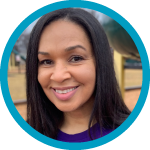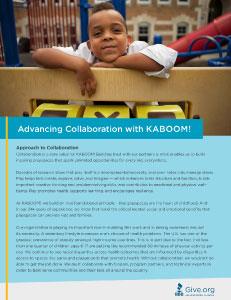
Advancing Collaboration with KABOOM!
About the Organization
KABOOM! works with communities to build incredible, kid-designed playspaces. Kids who don’t have access to a place to play miss out on childhood and are denied critical opportunities to build physical, social and emotional health.
We envision a world where every kid can get the play they need to thrive, regardless of race, zip code and family income.
Over the last 23 years, we’ve built or improved 17,000+ playspaces, engaged more than 1.5 million community
members and brought joy to over 11 million kids. As we look to the future, we’ll continue our efforts to build collective action and community opportunity, spark hope and enable kids to reach their full potential. And we promise that
we won’t stop until we put an end to playspace inequity. For good.
Featured Guest
Lysa Ratliff
CEO
KaBOOM!
Approach to Collaboration
Collaboration is a core value for KABOOM! Building trust with our partners is what enables us to build inspiring playspaces that spark unlimited opportunities for every kid, everywhere.
Decades of research show that play itself is a developmental necessity, and even helps kids manage stress. Play helps kids create, explore, solve, and imagine — which enhances brain structure and function, builds important creative thinking and problem-solving skills, and contributes to emotional and physical well-being. Play promotes health, supports learning, and encourages resilience.
At KABOOM!, we build on that foundational principle – that playspaces are the heart of childhood. And in our 24+ years of experience, we know first-hand the critical mental, social and emotional benefits that playspaces can provide kids and families.
Our organization is playing an important role in enabling this work and in raising awareness around its necessity. A sedentary lifestyle increases one’s chance of health problems. The U.S. has one of the greatest prevalence of obesity amongst high-income countries. This is in part due to the fact that less than one quarter of children ages 6-17 are getting the recommended 60 minutes of physical activity per day. We continue to see racial disparities across health outcomes that are influenced by disparities in access to spaces like parks and playgrounds that promote health. Without collaboration, we wouldn’t be able to get the job done. We must collaborate with funders, program partners, and technical experts in order to best serve communities and their kids all around the country.
For example, our partnership with Playful Learning Landscapes Action Network (PLLAN) in Philadelphia provides technical assistance to communities taking part in our Play Everywhere Philly program. This partnership allows communities to infuse their playspace projects with a research-based approach called playful learning that encourages cross-generational interaction and cognitive and social development.
We also must play a stronger role in partnering with peers in the sector, and with government and public systems. It is important for us to center communities in a way that allows us to collaborate in an organized way with peers. The more we focus on being the surround sound for kids and community, the faster they will experience change.
When it comes to the well-being of our kids, everybody has an important role to play. Playspace inequity is deep-rooted and systemic. It manifests differently in different communities. Without collaboration, we cannot fully understand the problem and we cannot adequately address it.
Build Trust
KABOOM! has been working hard to build up trust as the national leader on access to high-quality playspaces since our founding 25 years ago. In that time, we have built or improved more than 17,000 playspaces, serving more than 11.6 million kids.
Transparency and willingness to learn also lend themselves to continued trust among our community and funding partners. We have learned a lot over a quarter-century. In recent years, we have shifted our focus to become more intentional
about building where there is the greatest need and addressing the issues of historic, systemic racism that have driven those gaps.
Meaningful community engagement is key to establishing trust in the neighborhoods where we are building. Recognizing that no two communities are the same, our community engagement model outlines explicit opportunities for community members and kids to express needs and wants for their new playspace. KABOOM! works to incorporate those design elements, receiving community feedback at multiple pre-established checkpoints as part of a responsive, flexible planning process.
We must also pursue a deeper understanding of the racial exclusion in public spaces, both generally in our nation’s history and more intimately within the context of specific communities where we are working. Those strong, community-centric relationships lend themselves to trust and credibility with our funding partners, who are interested in our ability to demonstrate measurable impact and maintain and grow relationships with key program partners.
Have a Vision
KABOOM! is intentionally transparent and explicit about our mission and the “why” behind it as we seek to collaborate with partners. We believe that placing equity at the heart of our work will yield high-impact partnerships with value-aligned organizations. Playspaces support a range of outcomes for kids, so we have plenty of space to find common cause with partners across sectors, industries and issue areas. This allows us to link our work to a variety of outcomes.
- United Healthcare partnered with KABOOM! as part of its “Empowering Health” commitment to expanding access to healthcare and addressing social determinants of health.
- KABOOM! and municipal partners in ten counties are driving a Texas Playspace Equity Initiative. Environmental resilience and inclusive play are two core objectives of the initiative, with play features encouraging environmental education.
Seek to Assure the Success of Your Collaborators
When managing collaborative projects, we set clear, value-aligned objectives and ensure that there is a refined process in place with clear action points that will lead to desired outcomes. The six tenets of our new community engagement model are designed to drive specific outcomes, while also ensuring that the process itself is collaborative and builds trust amongst all participants.
- Lead with our Values
- Anchor in Community Context
- Recruit Diverse Voices
- Create Feedback Loops
- Employ Practical Tools
- Identify New Skills and Capacity Needed
Regular check-in points are incorporated in to our collaboration process so that we can shift and adapt where needed.
For example: Design Day is a critical part of the KABOOM! community engagement process. Kids sketch out their dream playground, and KABOOM! and our partners incorporate those design ideas to ensure that the new playspace meets the needs and wants of kids who will use it on a daily basis. During the coronavirus pandemic, we had to rethink this process to ensure the safety of our communities while still keeping their needs at the forefront of our design process.
- In March 2020, we held our first virtual design day in partnership with Travelers Insurance and South Ridge High School in Phoenix, AZ. Students envisioned a multi-sport court with spaces to play basketball, volleyball, and badminton. After months of virtual community planning meetings, the court was completely installed and ready for students to use by September 1.
Take Stock
Recognizing our own capacity and realizing where we should pull in external resources is critical to executing thoughtful, well-designed playspaces – and to tackling pervasive issues like racial injustice. By building relationships with design
experts, we were able to establish the Wilson Play Everywhere Design Challenge. The challenge pairs communities with designers to bring unconventional, learning-driven playspaces into public spaces – such as implementing swings at bus stops
or play zones at laundromats – in neighborhoods that have experienced significant disinvestment.
Taking stock of organizational weaknesses also provides room for us to grow and expand our impact. Over the last few years, we have
shifted from stating that we work to ensure “all kids have access to play,” to spelling out more explicitly which kids do not have access to play – and why. This shift required a reckoning and a reassessment of our capacity,
our skills, our level of training, and the new tools and education that we needed to pursue. But by grounding ourselves in the history of racist exclusion from public places, we were able to become more effective, working toward the root of playspace
inequity rather than providing one-time solutions.
Start Small
Each new partnership or project we pursue begins with the need for a playspace. Depending on the trajectory of our relationship with the community and the community’s own vision for the space, our projects can expand in scope or complexity as we build confidence and trust.
We began working with the Eat.Learn.Play Foundation, Oakland Unified School District, and The CarMax Foundation to improve a playground at Franklin Elementary School in Oakland, CA. During the community engagement process, kids and community members identified a multi-sport court and a community garden as additional needs. We are now bringing in the additional funders and experts that we need to bring this vision to life.
KABOOM! Has a proud history of partnering with communities and city leaders in Baltimore, building or improving 60 playspaces over the last 23 years. In 2019, building upon our relationships within the city, we formalized our partnership with the Baltimore City Public Schools System (BCPSS) to work toward solving playspace inequity across the city’s public schools. Our initial step was to conduct a playspace assessment which found 31 Baltimore city schools in need of new playgrounds. Enrollment data showed that these schools have more Black students and students receiving free and reduced-price lunches compared to the system as a whole. We continue to work closely with BCPSS to fill the gaps identified in the playspace assessment, and at the same time we’re using this data as a catalyst to bring on additional partners to support a bold shared vision.
Trusted relationships are built on ongoing two-way communication. We are motivated to regularly reflect and circle back with the communities we partner with so that they tangibly see their influence over the decision-making process and outcomes. So much of the feedback happens during the in-between moments. Ensuring we are focused on establishing and building a relationship allows us to truly learn from and trust each other every step of the way.
We recently relaunched and piloted our community engagement model. This allowed us to test new feedback loops that we feel set us on a stronger track to foster a sense of community ownership and belonging. By providing touchpoints with opportunities for real-time feedback with community members, we were able to receive direct and actionable feedback.
Take a Portfolio Approach
KABOOM! employs this portfolio approach through our multi-market strategy, which aims to:
- 1) Establish KABOOM! as a partner with cities and municipalities to co-design and implement playspace initiatives for schools, housing, parks, and other spaces accessed by kids
- 2) Implement multi-year, multi-faceted playspace development initiatives that enable data-guided, system-wide impact across multiple cities with similar contexts
This place-based approach allows us to identify areas with a demonstrated need and a healthy ecosystem of partners with shared priorities that can help us solve playspace inequity on a broader scale.
We also build upon existing collaborations to create additional value when we must pivot or adjust our organizational objectives.
When playspaces around the country closed during the coronavirus pandemic, KABOOM! established a Playground Reopening Taskforce to develop actionable resources for playground owners and operators. The Taskforce included members from our network of program and thought leadership partners, such as the National Recreation and Parks Association, the City Parks Alliance, and the Brookings Institution.
Consider Non-Traditional Partners
Collaborating with non-traditional partners is critical for us as we work to identify and address unique needs within each community where we work.
KABOOM! partnered with Chicago CRED (Creating Real Economic Destiny) and the Chicago White Sox to address gun violence in the Pullman neighborhood of South Side Chicago. With Chicago CRED’s support, KABOOM! brought together Chicago CRED, Chicago Park District and the Chicago White Sox. The community rallied around building a neighborhood playground, which represents a brighter future for kids and families and also helps to recognize the progress being led by young men from the community.
Keep Your Donors Apprised of Your Collaborations
Regular one-on-one communications between our relationship owners and funders plays a crucial role in driving collaboration and trust. Building personal relationships allows us to find long-term collaborators who realize that playspace inequity is a complex and deep-rooted issue, and are committed to helping us get to the heart of it. We also keep our donors informed of new partnerships and collaborative projects through regular digital communications including our newsletter, web, and social media.
Future Collaborations
Our ideal collaboration is any collaboration with a values-aligned, impact-driven partner. Our ideal partners understand the importance and urgency of pursuing racial equity. They understand the complex history behind these issues and the long-term investment (time and money) that it will take to reach our mutual goals. We are open-minded and flexible when it comes to new partnerships. That allows us to come together with unexpected organizations who have a creative vision around how our mission of ending playspace inequity for good aligns with their unique values.
This flexibility is crucial for as we carry out community-centered work. We need to let communities state their own needs and let them drive the vision for their public spaces – rather than assume that we know what is best for them.
KABOOM! continues to partner with child-serving and educational organizations, including both private and public schools, childcare centers and after-school organizations to provide kids with every opportunity to improve learning through interactive, active play.
This article was composed by Rachel Romana Liu.



